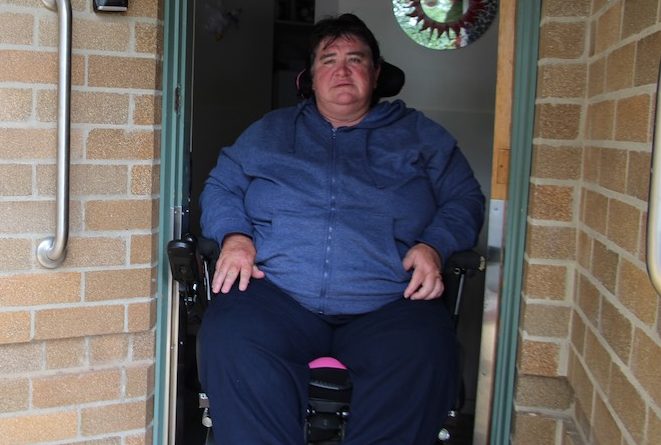
AFTER more than 35 years of hell, Dianne Corcoran, a woman living with spina bifida, has had enough of Housing ACT putting her in homes that aren’t disability modified.
Dianne, 53, of Nicholls, has been placed in three homes in that time that were inappropriate for someone who uses a motorised wheelchair.
It’s been a nightmare, according to Dianne, who says two homes before her current one, she was put in a split-level flat in Kingston, where she had to “bum it” up and down the stairs.
She had to leave three tripod sticks around the house to move around because she couldn’t use her wheelchair.
Dianne was then moved to a one-bedroom flat in north Lyneham where, she says, the bathroom was too small and the shower stuck out too far, so she couldn’t get to the toilet.
“It was not wheelchair-friendly at all,” she says.
Fed up with being placed in unmodified homes, she took her complaint to a local TV news service, demanding a disability-friendly home.
A few days after the interview Housing ACT got her a new home – the one she’s in now – but it wasn’t modified either; no ramps, no front-door railings, no bathroom modifications and no patio.
She’d felt pressured to move in, accusing Housing ACT of saying she’d go to the bottom of the waitlist if she didn’t.
Initially, Dianne says she had to borrow a ramp from a friend to get into the house, then she had to fight to get the back ramp done. It was made of wood and lasted only two years.
“It rotted, and then I fell over it,” she says.
“The ambulance had to come and lift me up off the ground. I was stranded out there for hours.”
It’s since been replaced but the big issue since day one has been the width of doorways, she says.
“They are too small. Getting through the door is a nightmare. Sometimes it takes about five minutes,” she says.
“The door has ripped the side of the chair and has cracked the controller, which would cost about $5000 to replace.”
She says her requests to have the doors widened have been met with excuse after excuse, including it being a structural issue.
But Dianne says she’s had a building engineer and builder look at the problem and both told her there was no reason the brick couldn’t be shaved back to widen the door.
Recently, Dianne says Housing ACT demurred on what she believed was the offer of a “Class C” house in Taylor in July. A Class C house is a specially modified building with wider door frames to allow for wheelchair movement.
“They got my hopes up high,” she says.
“I wouldn’t mind having a modern, bigger house to get around in, but if they’re not going to give me a new house, then do this house up.”
However, a spokeswoman for Housing ACT said the Allocations Unit and Growth and Renewal Program does not “promise” clients homes before delivery and allocation.
Dianne is adamant she was and says: “This whole situation has been stressful and very, very tiring. I’ve ended up in hospital more than a dozen times because of the stress.”
Dianne’s dilemma isn’t uncommon among the disability community, with Advocacy for Inclusion CEO Nicolas Lawler saying the current housing wait times for people with a disability are about three years.
“There’s a complete shortage of housing,” he says.
As for placing someone, like Dianne, in an unmodified home, Nicolas says it’s putting their welfare at risk and is not appropriate.
“I understand the need for urgency in terms of there’s a house here, this person needs a house, let’s just get them into the house, but if they can’t do anything when they’re in there, it’s bad for the person’s welfare,” he says.
“More attention is needed and certainly more housing-specific homes are needed within the ACT, but more importantly there needs to be that broader consultation with people who have a disability to ensure that their needs are met.”
It’s something that Housing ACT believes it is doing, with its spokeswoman saying it’s committed to providing safe, accessible and affordable housing for people with disabilities.
“During the application and assessment process, Housing ACT gathers information on disability requirements and uses this to inform the offer and allocation of a property that is suitable to the individual’s needs,” she says.
Who can be trusted?
In a world of spin and confusion, there’s never been a more important time to support independent journalism in Canberra.
If you trust our work online and want to enforce the power of independent voices, I invite you to make a small contribution.
Every dollar of support is invested back into our journalism to help keep citynews.com.au strong and free.
Thank you,
Ian Meikle, editor




![Canberra’s woodchopping association – the Hall and District Axemen’s Club – is rebranding to Capital Country Woodchopping.
“We didn’t want to be exclusively a Canberra association and we deliberately left any gender-specific wording out in the new name,” says president Cheyanne Girvan, 32.
“We also went a different [way] to other associations under NSW by not including ‘association’ in our name.”
Four years ago the Hall and District Axemen’s club’s membership was 25.
Cheyanne says this name change will give the club the versatility to grow into other areas and on to greater things.
To read on about Cheyanne's story with the woodchoppers, visit our website at citynews.com.au or click the link in our bio!
@@capitalcountrywoodchopping
#woodchopping #woodchoppinggirl #woodchoppingaustralia #axemen #axewomen #woodcutter #canberrastories #storiesthatmatter #citynews #journalism](https://citynews.com.au/wp-content/plugins/instagram-feed/img/placeholder.png)
Leave a Reply